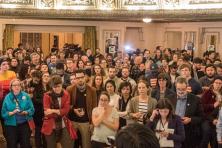OK Husky fans (or not), it’s time to let the dawgs out for Divest UW. Student divestment leaders are presenting their case to the Regents TOMORROW. All the info you need to weigh in is at the Divest UW site, but I’ll make it easy: Contact the Regents here. Know a prof? Urge them to sign the faculty petition is here. Alumni can support here.
The Regents could have saved a bundle by divesting when the students first asked them to; coal stocks have tanked as energy markets turn to cheaper, cleaner sources and the fossil fuel resistance grows. UW Treasury officials contend that based on long-term past performance, fossil fuels are likely to remain a good investment (a situation that would only arise if we conspicuously fail to respond to the climate crisis – a self-fulfilling prophecy). Student divestment leader Alex Lenferna responds:
“An analysis that presumes that the next twenty years for the fossil fuel industry will be the same as the last twenty is similar to believing that Blockbuster is the future of home movie viewing.”
But the point remains, regardless of the modest effect one way or the other on short term returns: we need to disentangle ourselves from the business model that is killing us – the unlimited extraction and combustion of fossil fuels, and the reckless abuse of political and economic power to thwart responsible climate policy.
Can UW stop all that by divesting? Not by itself, of course. But it can take a specific, concrete step in the right direction by detaching the University’s financial well-being from the investment cycle that escalates the climate crisis and blocks solutions. Insofar as its academic contributions to solutions are an important part of its mission, this would resolve a conflict of interest: a rational climate policy would hurt the University financially, as long as they remain shareholders in Peabody and Exxon. Divestment would lend a sense of integrity to UW’s many on-campus efforts to advance solutions – the kind of clarity and conviction that will help attract top students and faculty. Should the University decline to take this positive step because it will not, by itself, solve the problem? We’ll never get very far that way!
Everyone can and should divest, but academic institutions have a special imperative. The fossil fuel industry, supported in some part by the UW endowment, has stooped to a form of political manipulation that poses a direct, existential threat to the purposes of academia. It has, with an alarming degree of success, prevented our institutions from acting on the basis of what our minds know about the dire objective reality of our circumstances on the planet. It’s simple: Universities exist to shed light, so they should stop financing darkness by investing in fossil fuels.
By investing its assets in fossil fuels, UW is feeding a conscious and cynical effort to undermine the essential good that the University exists to serve: cultivating the unique human capacity for action based on reason. The fossil fuel industry has not just “won” the climate policy battle in Congress. It has seriously undermined the very ability of our democratic institutions to function – to act decisively and rationally in the public interest. Climate “debates” in Congress are mostly fodder for Comedy Central, and the institution hasn’t even considered a climate bill since 2010. As a citizen, I find this unconscionable. As a graduate of a public policy program, I take it personally.
Some University officials worry that divestment is inappropriately political. But investing in fossil fuels is more political than divesting. The students are not asking UW to give the money to Greenpeace, or to even to invest it in clean energy companies. Divestment simply withdraws support from activities and companies that block solutions and fund the climate denial that has so disfigured public debate. It is more passive than investment with respect to “political” outcomes.
As the parent of a student who led the divestment effort at her college, I know what these students are up against. It can be a slog, but they are indefatigable, and they’re gaining ground. Says Bill McKibben in his terrific new piece in the Guardian:
The campaign to force institutions to sell their fossil fuel stocks – which an Oxford study described as the fastest growing divestment campaign ever – has rolled up significant victories. Universities from Stanford to Sydney have started offloading their shares. At first the industry feigned unconcern – “someone else will buy the shares,” their lobbyists said with a patronising smile. Silly kids.
But the divestment movement never thought it could bankrupt BP in the short term. Instead: intellectual, moral, and political bankruptcy. Campaigners had a story to tell, one based on compelling new math first compiled by London’s Carbon Tracker Initiative…. What in 2013 was the rallying cry of a few student campaigners has by 2015 become the conventional wisdom: there’s a “carbon bubble,” composed of the trillions of dollars of coal and oil and gas that simply must be left underground.
The students at UW won’t take no for an answer. History (not to mention Desmond Tutu) is on their side. If you are too, they could really use your help right now. Contacts, talking points, all you need is at Divest UW.
Or even quicker: email regents@uw.edu with a personal note supporting divestment.




